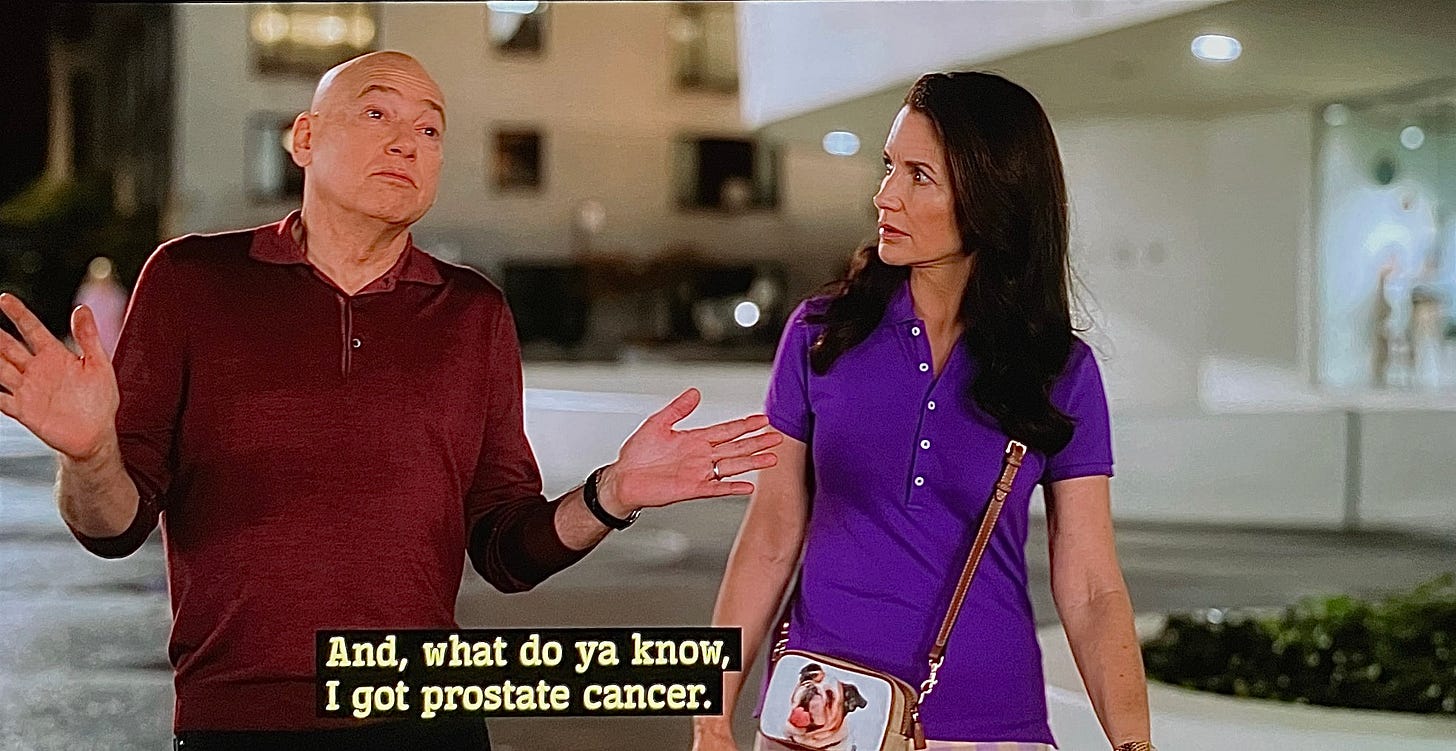'Just like that...'? Prostate Cancer and the City?'
A year of prostate cancer awareness. AS? We're just not that dramatic.
By Howard Wolinsky
HBO’s “Sex and the City” broke new ground on discussing female sexuality and sharing women’s attitudes about life and work in its initial run during the turn of the century in the Big Apple.
Now it’s latest sequel, “And Just Like That,” with the characters aging, is tackling prostate cancer—with artistic license.
The PCa world is grateful for any attention—even if it’s slightly incorrect—when research funding is flagging and incidence is on the rise with s a “tsunami’ of PCa on the horizon. Screening, despite its problems, needs a boost—and Sex and the City (and former President Biden and his Gleason 9) are doing just that.
It’s a publicist’s wet dream.
The original Sex and the City focused on the romantic and personal lives of four female friends in their 30s and 40s navigating love, sex, and careers in New York City. It presented honest portrayals of female sexuality and women who, while seeking love, were also fulfilled by careers and friendships.
Nearly 20 years have passed since Carrie Bradshaw (Sarah Jessica Parker) & Co. went on HBO. The women, now in their 50s, have grown up and face new challenges in “And just like that ….”
The episode on June 26 tells the story of Charlotte’s husband Harry Goldenblatt, a bigtime NYC divorce lawyer, and his diagnosis with prostate cancer.
Harry is played by Evan Handler, who is in real life is 64, prime age for a prostate cancer diagnoses.
Prostate cancer, not exactly the sexiest topic in the city, is getting a moment in the sun.
It may only be a TV show but its aging audience —female and male alike—are of that certain age when screening, diagnosis and treatment of prostate cancer should be discussed.
While walking past the iconic Guggenheim Museum, Harry tells Charlotte (Kristin Davis) why he wanted to get some fresh air with her.
“To get away from the kids? Me too,” she said.
Nope.
Harry wanted to share the fact he had been experiencing a couple unusual symptoms and decided to go to the doctor for a check-up, presumably including a PSA blood test.
“What do you know? I got prostate cancer,” he informs Charlotte.
Charlotte’s always the rather fragile sort and starts to freak out.
Harry reassures her: “Everything is going to be fine, We caught it early.”
(The Guggenheim—Howard Wolinsky.)
The headline over an excellent article in Time Magazine, by health and wellness editor Angela Haupt, aptly asks “Is the Prostate Cancer Plot on And Just Like That Realistic?”
In a word: NO!
The writers took some—make that lots of— artistic license with Harry’s story.
Symptoms occur in high-grade cases like Biden’s. But Harry is supposed to have a lower-grade cancer; the cancer was detected early. He’s not likely to have symptoms with an early cancer.
The program unfortunately perpetuates some of the mythology of prostate cancer.
“It would take a tumor that’s pretty far along to get to the point where it would cause those symptoms,” Dr. Mark Pomerantz, clinical director of the Lank Center for Genitourinary Oncology at the Dana-Farber Cancer Institute, told Time.
“There’s definitely some creative liberties the show has taken,” Dr. Julia Willingham, a urologist who treats prostate cancer patients at Texas Oncology, told Time: “It makes sense—it helps drive the plot forward—but most early-stage prostate cancer has no symptoms at all.” That’s why some people call the disease—which will affect more than 313,000 men in the U.S. in 2025—a silent killer. It’s almost always detected via a routine prostate-specific antigen (PSA) test, a screening blood test that most men undergo every couple of years or so starting around age 50 for those with average risk. (Exact screening frequency depends on a person’s age and risk factors.)
In fact, Pomerantz said if Harry were a real-life patient, there’d be reason to believe his disease was advanced. “It could still be local”—which means it hasn’t yet spread beyond the prostate—“but it would take a tumor that's pretty far along to get to the point where it would cause those symptoms.”
Some other problems with the story for us PCa watchers: We don’t know whether Harry had been screening since his 50s. We don’t know his PSA, whether he had a prebiopsy MRI, had any biomakers tested, or what his Gleason score is.
Maybe we’ll get answers as the story develops? I suspect that’s too deep in the weeds for Hollywood. That’s a shame because this could be a teaching moment.
Still, the intentions are good.
Some in the PCa world are simply grateful for any attention we can get, hang the accuracy I guess. Just spell “prostate cancer”right.
Dr. Phillip Koo, chief medical officer at the Prostate Cancer Foundation told Time: “I’m ecstatic about this plotline, because the awareness and discussion around prostate cancer is often hidden. Men don’t like talking about it—I think we often put up that tough shell on the outside, especially when it involves the sort of organs that men define their masculinity based on. I think it’s wonderful we’re raising awareness.”
There are advantages to getting the word out at a time when the incidence of prostate cancer, especially advanced cases, is on the rise globally. To paraphrase showman P.T. Barnum: “Say what you will, just don’t spell it prostrate.”
Harry reassures Charlotte that “everything is gonna be fine” because the cancer was caught early.
Harry tells her that actor Robert De Niro, zillionaire Warren Buffett, and South African activist and later President Nelson Mandela all had prostate cancer.
[Mandela died at 95 from a prolonged respiratory infection—not PCa. Harry was correct when he noted the five-year relative survival rate from PCa is 98%/]
Of course the list of A-listers with prostate cancer is way long. I write about them all the time—few go on AS—and even have a column about them in TheActiveSurveillor.com.
Harry asked Charlotte to keep his diagnosis secret.
“Don’t tell anyone,” Harry orders Charlotte.
That’s not unusual, even among low-risk patients. I did a survey a couple years ago that found that maybe 30% keep their diagnosis from family, friends and business associates.
Harry said he didn’t want to be known as “that cancer guy.”
“Frank Westerman,” an attorney, shared his story and why he keeps his advanced prostate cancer secret. My survey found that 25% of men regrets donning the cloak of silence
(I have told a few men that by withholding their diagnoses they are depriving family members—like sibs and cousins—male and female—of vital information since some of this cancer has genetic roots. 25% regret keeping things under wraps. I have heard from guys who finally shared their secret that business associates have been very understanding.
Maybe the writers will work in more about Harry’s care as the season goes on. I predict Charlotte or Harry will spill the beans. What do you think?
Question: If it’s so early, why not have put Harry on Active Surveillance, for which patients the majority of newly diagnosed patients qualify?
I suppose it’s for dramatic purposes. AS apparently does not lend itself to TV plots, Maybe someday, but not yet. We’re like the Maytag repairman—boring and undramatic in general as we follow Active Surveillance.
Other PCa items
—Check out the folly of remote transcontinental robotic radical prostatectomy in my other Substack, Prostate Cores.
—Please respond to my confidential survey on genetic testing and PCa. At the end of July, I will be moderating a program for ASPI on the importance of genetic testing for prostate cancer patients. Click here: https://forms.gle/Uv9d5gaZYHadZ5Qh9
—Please answer this questionnaire.on transperineal vs. transrectal biopsies: https://forms.gle/GShpHwegEPtAVgTs9 I have a relevant story coming, and you can take a few minutes and help if you haven’t already.






Thanks for letting me know about Ko-fi and for being my first donor.
I am now officially part of the "gig economy" I've heard so mcuh about.
I added the button at your suggestion and hope it will increase my revenue.
Under the "Big Beautiful Act," if passed, I guess I won't have to pay taxes.
I need a revenue. I just figured out that after expenses I am earning $13/hour or less. Better than losing money like I did the newsletter's first two years, several thousand a year.
People tghink information on the internet is free. But actually, someone is working away to prepare those "free" articles.
If people can afford it, a paid subscription would help me keep the newsletter going.
If you can't afford it, I understand. I made a decision initially to provide information you may not have heard from your physician available. You can educate yourselves and share with your doctor.
Remember my motoo: "Saving Prostates Daily."
Then, I started to see overhead charges. Then, I created paid subscriptions. But I priced them too low. I raised the price.
A friend suggested that I start a $1,000/year private newsletter. I could do that.
But mission is to help and educate--But also not to lose money doing it.
I can make special arrangements if you want to pay less than $80/per year or $9/month.
If you to give me a tip: https://ko-fi.com/L3L01GYK56?achievement=true&og=first_received
PT Barnum is quoted "Say what you want, just spell my name right/"